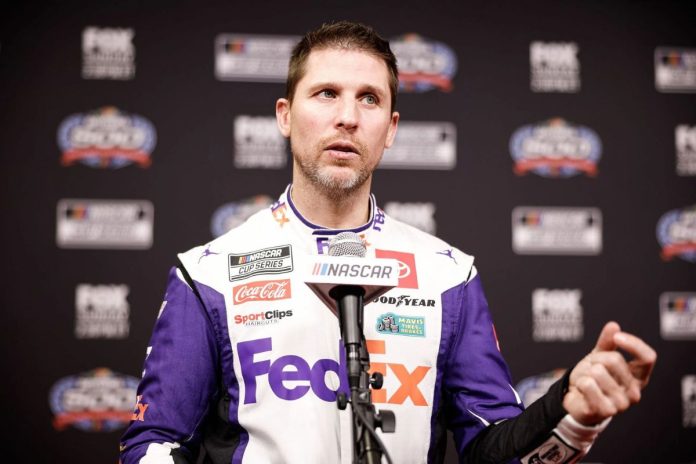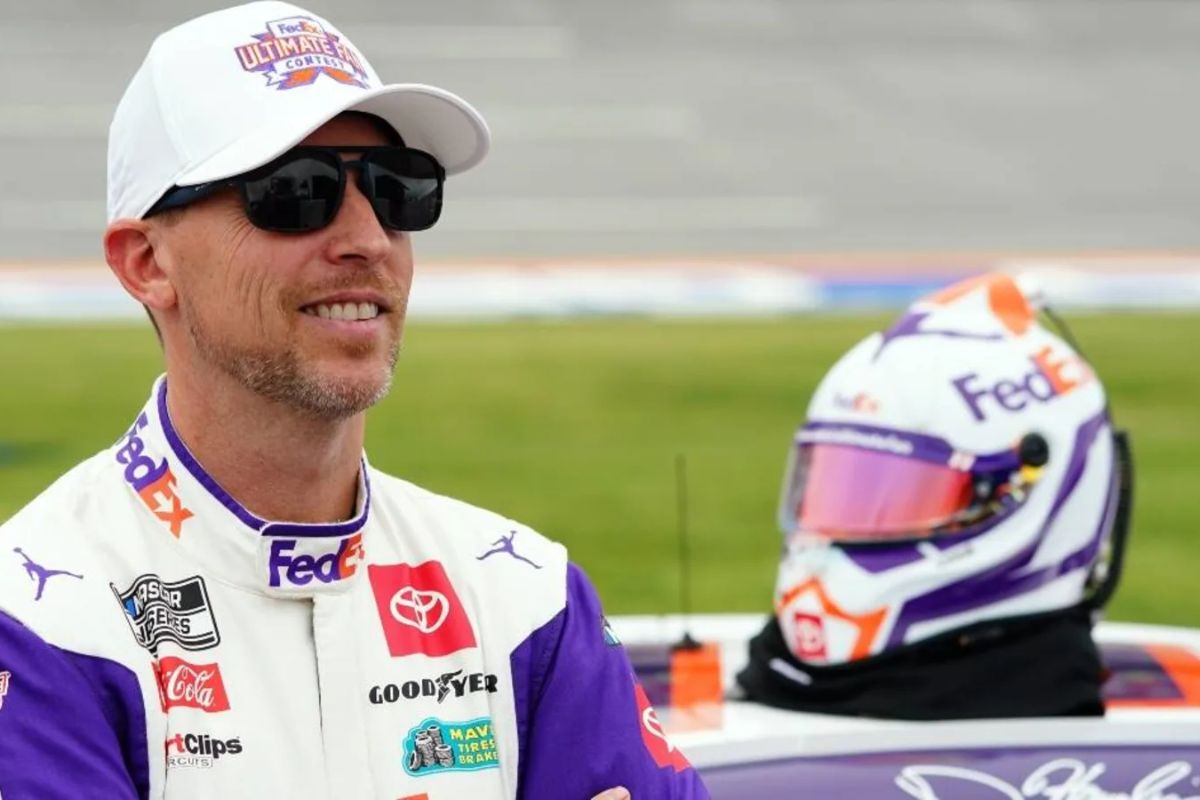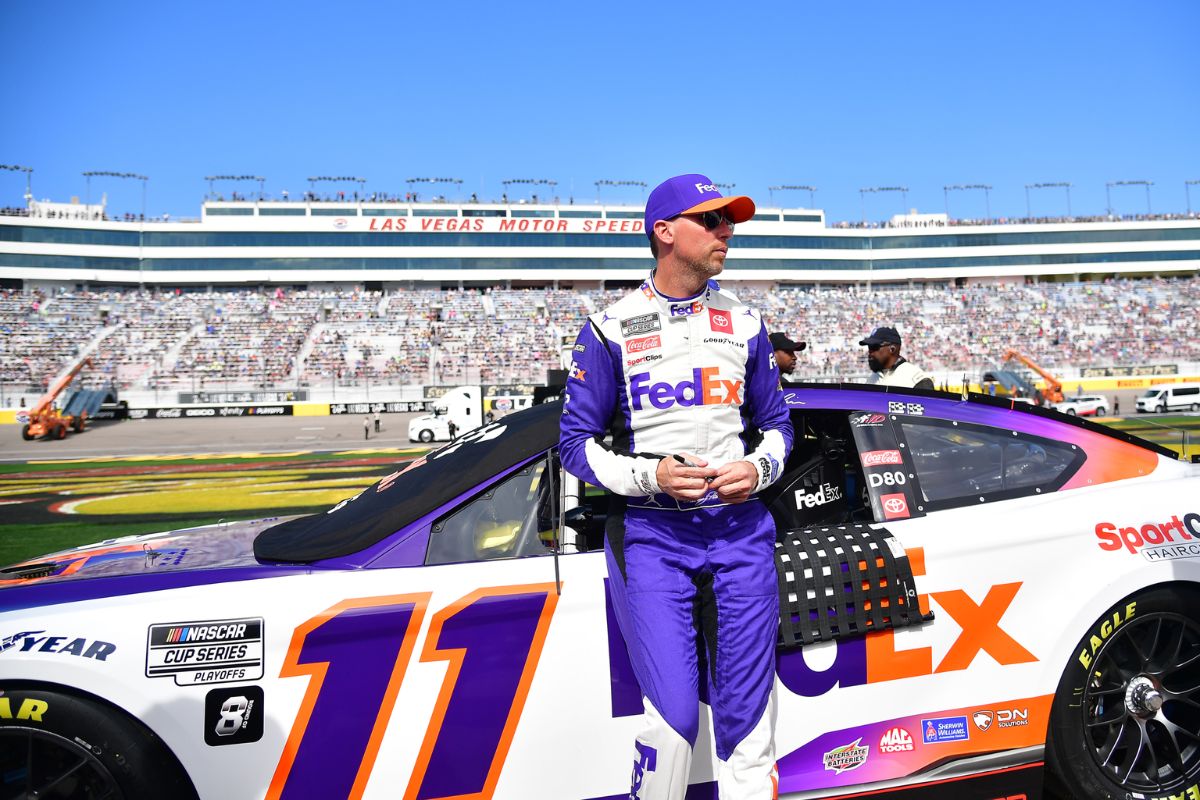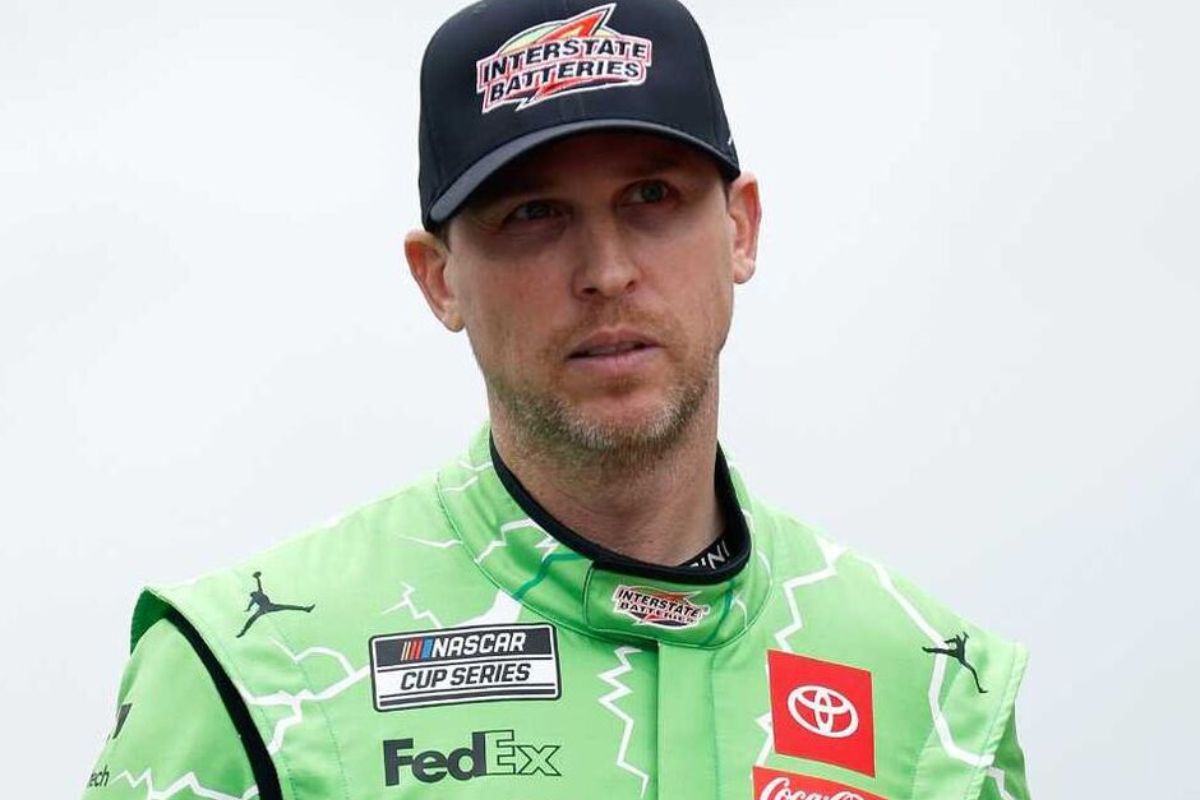Denny Hamlin Sounds Alarm on NASCAR: In NASCAR, Denny Hamlin‘s recent critique of the charter system casts a spotlight on underlying economic tensions that could dictate the future trajectory of the sport. His pointed concerns not only question the sustainability of team finances but also challenge the very framework that is supposed to guarantee stability and growth. As Hamlin and other stakeholders push for a more equitable revenue distribution and permanent charters, the impact of such changes could either fortify NASCAR’s foundation or lead to significant disruptions. This pivotal moment calls for an examination of whether the current charter system can adapt to the evolving landscape of auto racing, leaving many to wonder about the outcomes of this high-stakes negotiation.
Key Takeaways
- Denny Hamlin advocates for increased revenue sharing to support team sustainability.
- He emphasizes the need for permanent charters to ensure financial stability.
- Hamlin highlights the financial challenges teams face with current charter payouts.
- He calls for greater team input in NASCAR’s decision-making processes.
- Hamlin warns that without financial restructuring, the sport risks losing teams.
The “Cold War” Between NASCAR and Team Owners
The ongoing ‘cold war’ between NASCAR and team owners over the renewal of the charter system is intensifying, as both parties struggle to align on terms that could shape the future of the sport. This discord arises from the high stakes involved in the charter system, which was originally designed to provide teams with financial stability and operational certainty. As the expiration of the current deal looms, the renegotiation has hit a critical point, marked by a complex interplay of financial, operational, and strategic considerations.
From NASCAR’s perspective, the charter system needs to evolve to maintain the sport’s competitiveness and appeal. This includes possible adjustments to the revenue sharing model and the introduction of performance-based metrics, which would guarantee that teams are rewarded for competitive success and penalized for poor performances. Such changes are seen as crucial for the sport’s dynamic growth and sustainability.
Conversely, team owners are wary of modifications that might threaten their financial security. Many rely on the stability provided by the existing charter terms to plan long-term investments and secure funding. The prospect of a performance-linked revenue model introduces a level of uncertainty that could deter potential investors and destabilize team operations.
Denny Hamlin Addresses the Charter Deal Standstill
Amidst the escalating tensions between NASCAR and team owners, Denny Hamlin recently vocalized the specific concerns of the teams regarding the charter renewal standstill. At a press event designed to illuminate the ongoing disputes, Hamlin outlined the critical areas that have hindered progress in negotiations, presenting a clear and structured argument on behalf of the team owners.
“Feel like we have been. I think that it’s just a tough situation because every team does want a little different things here and there. There are four basics that we all feel like we deserve.” Hamlin
Firstly, Hamlin pressed on the necessity for increased revenue sharing for the teams. He underscored the disparity in the current financial model, where the teams bear substantial operational costs but do not adequately benefit from the entirety of income generated by the sport. This, he argued, is unsustainable for the growth and health of the teams.
Secondly, the concept of permanent charters was brought to the forefront. Hamlin highlighted that the absence of permanent charters introduces a significant element of instability and uncertainty, making long-term planning and investment challenging for team owners. This insecurity, according to Hamlin, deters potential investors and could stifle the developmental trajectory of the sport.
Moreover, Hamlin called for greater team input in NASCAR’s decision-making processes, particularly concerning regulations that could lead to unexpected cost increases. He pointed out that without substantial input, teams are often left unprepared and financially strained by sudden regulatory changes.
In NASCAR, Denny Hamlin recently talked about how a TV rights deal made things unequal. He said it’s not fair how some drivers get more attention than others. This makes things harder for smaller teams. Hamlin wants things to be more equal for everyone.
“But I mean, why this is such an important thing is we’ve had 11 teams go out of business since 2016. That’s not good. And certainly, if we can continue on the trend of a couple of stakeholders doing really well and one not, that will continue. And that’s not going to be good for our sport.” – (Hamlin)
NASCAR’s Major Chunk and Team Owners’ Demands
In the ongoing debate over NASCAR charters, team owners are advocating for a significant increase in their share of the revenue, highlighting the financial difficulties many face under the current system. Reports indicate that the current charter payout of $8-9 million is not enough to cover the extensive operational costs incurred by the teams. This pressing issue underscores the significant gap between the revenue NASCAR generates and the portion that trickles down to team owners.
Teams in NASCAR aren’t happy about the charter extension. NASCAR boss France only wants to commit for seven years, but teams want it to be forever. It’s a big deal because it costs a lot, like $40 million. Denny Hamlin cares about teams being financially stable, but he also brings up the emotional side of things.
“Rick Hendrick and Joe Gibbs have invested in this sport for decades and deserve to give their kids that permanent charter and be something that can be passed down.” – (Hamlin)
Denny Hamlin discusses charter permanence and the current climate. 💼
"Rick Hendrick and Joe Gibbs have invested in this sport for decades … and deserve to give their kids that permanent charter." pic.twitter.com/gRozW4Xrzc
— Dirty Mo Media (@DirtyMoMedia) May 2, 2024
Denny Hamlin is worried about how long NASCAR will last. He’s not the only one—his co-owner Michael Jordan feels the same way. Jordan knows a lot about sports and business, so his concerns carry weight. They both want NASCAR to stick around for a long time.
“We’ve had 11 teams go out of business since 2016. That’s not good. And certainly, if we can continue on the trend of a couple of stakeholders doing well and one not, that will continue. And that’s not going to be good for our sport.” – (Hamlin)
Denny Hamlin and Michael Jordan’s Concerns
Frequently, Denny Hamlin and Michael Jordan raise valid concerns regarding the financial sustainability of NASCAR, emphasizing the dire need for permanent charters to secure a more stable future for team owners. These issues are not just about the profitability of individual teams but also about the holistic economic environment within which these teams operate. The sporadic nature of current charter allocations contributes to financial uncertainty, making strategic planning and long-term investments more risky for team owners.
Denny Hamlin’s insights into the financial instability caused by teams folding are particularly poignant. His perspective as a team owner and driver provides him with a dual view of the operational challenges and the competitive dynamics in NASCAR. This instability affects not only the teams’ operational aspects but also impacts their competitive performance, creating a cyclical problem where financial instability leads to poorer performance, which in turn leads to further financial distress.
Michael Jordan, brings a fresh and perhaps more global perspective on the importance of financial health in sports organizations. His concern about needing permanent charters to secure stable revenue streams is an echo of broader sports management practices where financial predictability is key to long-term success.
“If you had permanent charters, then you could create a revenue stream, either with new investors or different types of sponsorships that would subsidize that type of variance between ownership and the league. That’s a big miss.”
“If you don’t correct that, this sport’s going to die not because of the competition aspect, but because economically it doesn’t make sense for any business people.” – (Jordan)
Jordan’s financial manager Polk shows this point by characterizing team owners as ‘tenants,’ vulnerable to the whims of the sport’s organizational structure. This metaphor sheds light on the pressing need for structural changes within NASCAR to provide teams with more control over their financial destinies, thereby contributing to a healthier, more competitive, and ultimately a more stable sporting league.
“We’re basically tenants in an apartment building. We have these charters and they give us certain rights, and we have responsibilities because of the rights they give us. But at a date certain — which right now is Dec. 31, 2024 — we have no further rights to renew, and (the charters) could be taken away from us.” – (Polk)
Uncertain Future and Calls for Resolution
As tensions mount between NASCAR and its team owners, the quest for a resolution becomes increasingly important to the sport’s future sustainability. The standoff, marked by divergent views on the charter system’s implementation and financial disparities, has pushed NASCAR to a risky edge. The uncertainty not only threatens the operational aspects of the teams but also casts a shadow over NASCAR’s strategic direction.
The matter revolves around the distribution and management of the charters, which are necessary for securing a team’s participation and financial stability in races. Disagreements have surged over how these charters are allocated and the perceived inequities in revenue sharing, leading to calls for a more transparent and fair system. The lack of resolution could potentially unsettle the sport’s economic model and deter new entrants, thereby stifling competitive diversity and innovation.
News in Brief: Denny Hamlin Sounds Alarm on NASCAR
The escalating tension between NASCAR and team owners, exemplified by Denny Hamlin’s vocal criticisms, underscores the importance of a reevaluation of the charter system.
The current model, marked by financial instability and exclusionary practices, threatens the sport’s viability. A restructured approach advocating for equitable revenue sharing, permanent charters, and enhanced team participation in governance is essential.
Such reforms are vital to preserving NASCAR’s competitive integrity and ensuring its sustainability in the face of evolving economic challenges
Our Reader’s Queries
Q. What is Denny Hamlin driving?
A. Denny Hamlin continues to excel behind the wheel, showcasing remarkable skill as a driver. The new Toyota Camry has proven to be a formidable asset, providing our team with ample opportunities to excel on the track. The collective effort of everyone at Joe Gibbs Racing is evident as we strive for victory. With Hamlin and Christopher Bell securing four wins this season, JGR remains a dominant force in the sport.
Q. Has Denny Hamlin ever won a NASCAR championship?
A. Denny Hamlin has showcased his talent by reaching the Championship 4 on four occasions, albeit not since 2021. However, his four appearances slightly lag behind those of Joey Logano, Martin Truex Jr., Kyle Busch, and Kevin Harvick, all by just one, since the playoff format overhaul in 2014. Despite this, Hamlin holds the distinction of being the most successful driver in Cup history without clinching a series title.
Q. Who is number 11 in NASCAR?
A. Denny Hamlin, piloting the No. 11 Toyota for Joe Gibbs Racing, is a prominent figure in the NASCAR Cup Series. Additionally, he holds a co-ownership stake in 23XI Racing alongside NBA icon Michael Jordan. With an impressive tally of 54 victories under his belt, Hamlin’s notable wins include prestigious events like the Coca-Cola 600 in 2022, as well as multiple triumphs at the Daytona 500 (2016, 2019, 2020) and the Southern 500 (2010, 2017, 2021).
ALSO READ: NASCAR Pit Crew Rankings: Denny Hamlin’s Team Dominates





